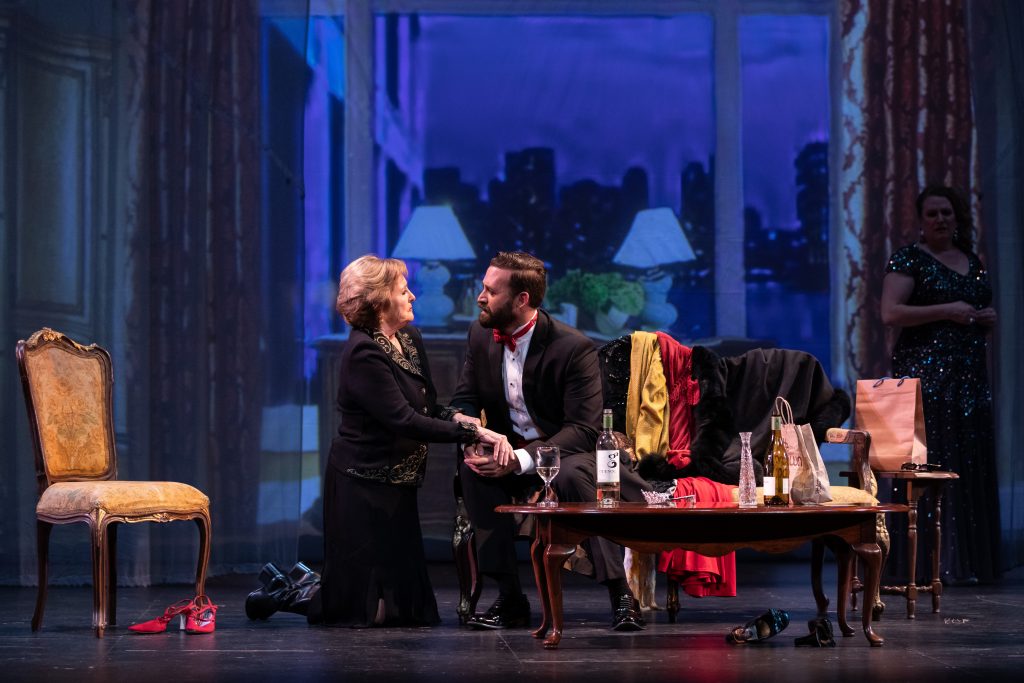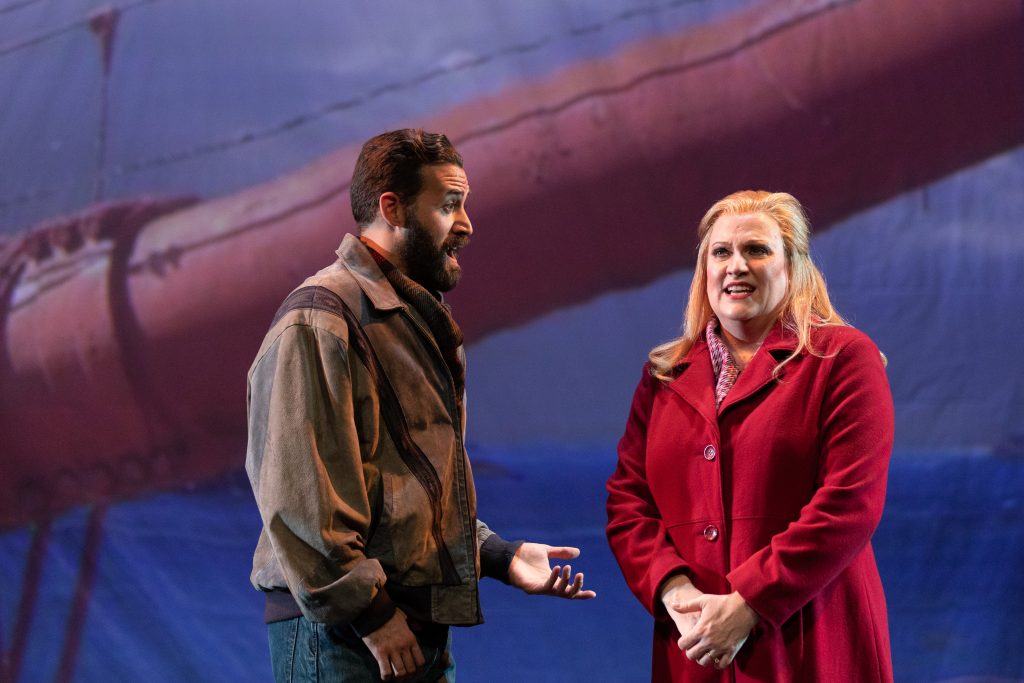Vocal Splendor in San Diego Opera’s Production of Jake Heggie’s ‘Three Decembers’
San Diego Opera’s love affair with composer Jake Heggie continued unabated Friday, March 8, with the company’s local premiere of his 2008 chamber opera Three Decembers in the Patrick Henry PHAME! Theatre. This torrid fling began with the company’s production in 2012 of his acclaimed Moby-Dick and blossomed with San Diego’s 2016 production of his comic opera Great Scott, each production a West Coast premiere from this successful young American composer.
Although Three Decembers is smaller in scale than either Moby-Dick or Great Scott, it shares with them Heggie’s voluptuous melodic flair—blessedly kind to singers and ingratiating to traditional opera audiences—and a flowing, inventive instrumental style that does not wear out its welcome, in spite of its unapologetic adherence to traditional tonality. The story, which circles around the character of Madeleine Mitchell, a lionized star of the American theater, and her two unhappy adult offspring, Charlie and Bea, ignites the emotional fireworks of Verdi’s Il trovatore, but without that opera’s inscrutable plot complications.

Frederica von Stade & Steven LaBrie [photo (c.) Karli Cadel]
Heggie created the lead for mezzo-soprano Frederica von Stade, which she sang with absolute assurance. To be sure, she has passed the age when most female opera singers have wisely ceased public performance, yet von Stade’s upper and mid rage displayed a power and clarity that remains a pleasure to behold. Like the jealous Tosca, Puccini’s gold-standard diva heroine, Maddy Mitchell has but one character flaw: not Tosca’s romantic envy, but rather the neglect of her children to further her career. Von Stade sagely developed his diva’s striving self-absorption without undermining our sympathy for her character’s humanity.
Heggie gives Maddy an important solo aria early in the piece, but because it is the finale of her latest Broadway success, it purposely stoops to a bland musical theater accessibility that made me squirm. Perhaps Heggie should have given her his version of a “Vissi d’arte.”
Stephen LaBrie’s robust, radiant baritone bowled me over after three notes and mesmerized me the rest of the evening. A young singer with a longer list of awards than roles performed on the stage, I predict LaBrie will become a leading Verdi baritone in short order. I hear in the richness of his voice—resonant and magnificently unified from its profound depths to its ringing heights—a compelling Renato, Iago, or Count di Luna. And I trust General Director David Bennett has signed up LaBrie for many return visits to his company. LaBrie’s Charlie, Maddy’s gay son coping with a lover wasting away with AIDS and distressed over his mother’s lack of acceptance and emotional support, deftly balanced his anger with filial loyalty.
Equally poised and wielding a vocally powerful spinto soprano with dramatic edge, Kristin Clayton convincingly created Charlie’s older sister Bea, the sibling old enough to recall their father who mysteriously disappeared early in their childhood. Heggie gives Bea rhapsodic flights to spin reveries about this absent father, and Clayton soared through these handily.
My first instinct in categorizing the emotional confrontations of this not sufficiently tightly knit family as crafted by librettist Gene Scheer was to suggest a late 20th-century American verismo. But the ambience was really more soap opera or telenovela. Scheer worked from a Terrence McNally script crafted for a 1999 AIDS benefit staged at Carnegie Hall, so some of Charlie’s resounding pleas for recognition and acceptance sound a bit dated since the Supreme Court legalized gay marriage. Yet, given the LGBT hostility of the current Administration and its Evangelical base, these issues have taken on unexpected urgency.
From the orchestra of a mere 11 instrumentalists, Heggie created a glowing sonic tapestry that drove the opera’s dramatic pulse splendidly. I especially appreciated his well-sculpted woodwind descants that floated over both the dialogue and dramatic ensembles and arias—a Heggie trademark. Adam Turner conducted this sparkling ensemble of musicians from the San Diego Symphony in the PHAME! pit.
Created for Hawaii Opera Theatre’s production of the opera, Peter Dean Beck’s minimal but always effective stage design skillfully augmented with projections that instantly conjured each scene’s location proved to be just the right scale for the wide stage of the PHAME! Theatre. Stage Director Karen Tiller, also part of the Hawaii Opera Theatre team, gave her singers constant but credible movement in scenes that could have seemed static with excessive chatter.

Steven LaBrie & Kristin Clayton [photo (c.) Karli Cadel]
With the lead character a storied actress, designer Helen E. Rodgers gave us the requisite plethora of grand, splashy gowns for Maddie, as well as tony casual wear for San Franciscan Charlie. On the night of Maddie’s Tony Award, everyone displayed picture perfect red-carpet finery.
The other winner in this San Diego Opera production was Patrick Henry’s PHAME! Theatre, a new, comfortable, decidedly upscale and generously proportioned venue in the Del Cerro sector of San Diego just north of San Diego State University. I can see the company returning here for future operas in its edgy dētour Series.
San Diego Opera opened Jake Heggie’s “Three Decembers” in the Patrick Henry PHAME! Theatre in San Diego on March 8, 2019, with a repeat performance on March 9 and a matinee performance on March 10.

Ken Herman, a classically trained pianist and organist, has covered music for the San Diego Union, the Los Angeles Times’ San Diego Edition, and for sandiego.com. He has won numerous awards, including first place for Live Performance and Opera Reviews in the 2017, the 2018, and the 2019 Excellence in Journalism Awards competition held by the San Diego Press Club. A Chicago native, he came to San Diego to pursue a graduate degree and stayed.Read more…
